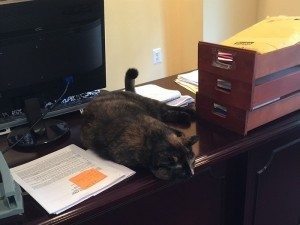 Dear Angel,
Dear Angel,
Q1. My father is hesitant about getting the COVID-19 vaccine because he has Parkinson’s. My friend is experiencing the same hesitancy with her mother, who is in the early stages of dementia. Have you heard anything about the COVID vaccine for people with Parkinson’s or dementia, and why they should or shouldn’t get it? Thanks for your help!
Cy Dafex
—
Dear Cy,
Thanks for your question. As a cat in a law office, I don’t typically give medical advice so your father and your friend’s mother and their caregivers should certainly check with a doctor before getting the vaccine. What I can share is my research!
The COVID Vaccine for Those with Parkinson’s
According to the American Parkinson’s Disease Association (APDA), there are no substantiated scientific concerns to suggest that the vaccines have a different safety profile in people with Parkinson’s Disease (PD) as compared to the general population, so what we know about the vaccines for anyone who takes them would hold true for those with PD.
The vaccine may cause short term side effects of fatigue, aches, and even fever. Again, at this time, there isn’t extensive data yet on how it affects PD symptoms, just anecdotal data. For some people, PD symptoms have gotten worse in the short term but doctors say that you will return to your previous baseline a few days after you take the vaccine.
Having PD might lead to a more complicated infection should you contract COVID-19, plus people with PD also tend to be older which further increases risk for complicated COVID-19 infection. Because of these issues, the APDA suggests that vaccination for COVID-19 for people with PD is a good idea.
The COVID Vaccine for Those with Dementia
Vaccines are an important step in protecting the health and safety of long-term care residents and staff, and the Alzheimer’s Association strongly encourages their use for everyone, including those with dementia.
Although dementia does not increase risk for COVID-19, dementia-related behaviors, increased age, and common health conditions that often accompany dementia may increase risk. For example, people with Alzheimer’s disease and all other dementias may forget to wash their hands or take other recommended precautions to prevent illness. In addition, diseases such as COVID-19 and the flu may worsen cognitive impairment due to dementia. For these and other reasons, the Alzheimer’s Association suggests that those with dementia get vaccinated.
Consent for the coronavirus vaccine should be considered in the same manner as other vaccines and health care decisions. If a resident cannot consent, health care providers will talk to the individual’s healthcare decision maker before taking any action.
As communities and care services begin reopening, it is important for caregivers to consider the risks and take additional safety precautions for people living with dementia, whether or not they are vaccinated. For tips regarding COVID for caregivers of loved ones with dementia, click here.
Again, if you have loved ones with dementia or Parkinson’s, be sure to discuss with your doctor any concerns you have about the COVID-19 vaccine.
Q2. Once I am vaccinated, can my loved one and I go back to doing things that we were doing before the pandemic?
A2: For the Pfizer and Moderna vaccines, you are not adequately protected from COVID-19 until about 2-3 weeks after your second vaccine dose. For the Johnson & Johnson vaccine, adequate protection occurs by about 2-3 weeks after the one required dose. Protection may be lower for some of the new variants of COVID-19 that are emerging, so masks and social distancing will likely remain in place for fully-vaccinated people when they are in public for the foreseeable future. You should also continue to avoid medium and large sized in-person gatherings. However, you can feel comfortable that your chance of getting the virus decreases drastically after you are fully vaccinated. In addition, even those who do get the virus after vaccination tend to have a milder course, which is another reason to seek vaccination.
Hope this is helpful!
Angel












